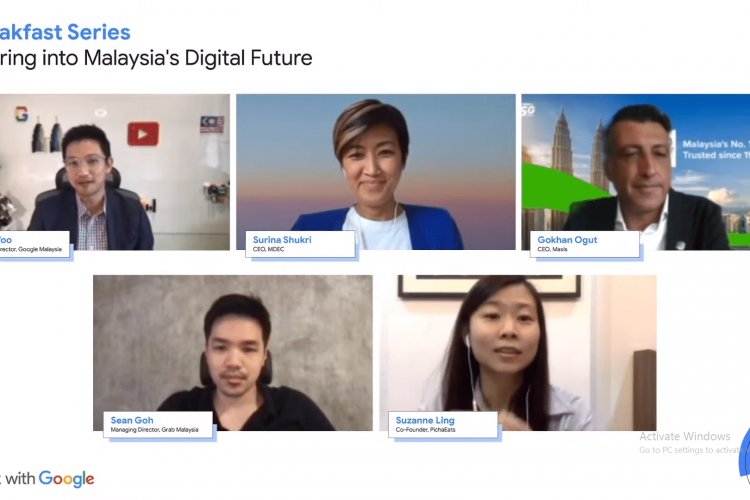Late in 2020, Google, Temasek and Bain & Company released its fifth edition of the e-Conomy SEA Report, projecting Malaysia’s digital economy to balloon 3X to RM125 billion by 2025. In order to understand whether Malaysian businesses share the same outlook, Google invited business leaders to share their own visions for Malaysia’s digital future at a panel titled Breakfast Series: Peering into Malaysia’s Digital Future.
The session saw the inclusion of Surina Shukri, CEO of Malaysia Digital Economy Corporation (MDEC); Gokhan Ogut, CEO of Maxis; Sean Goh, Managing Director of Grab Malaysia; and Suzanne Ling, Co-Founder of PichaEats. The session was moderated by Marc Woo, Managing Director of Google Malaysia.
Marc Woo kicked off the session by highlighting three key insights from the e-Conomy SEA Report which contribute to the promising digital future of Malaysia:
- Flight to Digital. In 2020, more than 1-in-3 Malaysians turned to digital services for the first time to access essential services. These include e-Commerce, food & groceries, healthcare, education and online media.
- e-Commerce Growth. Malaysia recorded a significant growth of 87% year-on-year in the e-Commerce sector, which is the highest among the Southeast Asia region.
- Digital Talent. Talent in the digital field remains the key enabler to the success of the digital economy, which requires the collaboration of multiple parties to ensure that momentum is sustained

New Insights from the Breakfast Series
Speaking about future trends, Sean Goh, Managing Director of Grab Malaysia shared, “There is one potentially unexpected shift we see and that is Malaysians will become more equal as human beings and in opportunities. An example of this is the true story of a deaf driver- partner who was able to communicate with a blind passenger using the text-to-voice and voice-to-text function on their phones.”
“Not only that, through AI and 5G, we could even have real-time translation between sign and verbal language, and also written and spoken language. It is amazing to see how positive changes that derive from digital growth are already evident through these inspiring stories,” Sean said.
Adding to these insights, Surina Shukri, CEO of MDEC shared, “Malaysians are now looking at ways to begin and advance their digital journey as opposed to the year 2020 where many were still considering the relevance of initiating this move.”
“The onset of Covid-19 has pushed for quicker adoption of digital in their business model, especially among the startups. Malaysia will realize that we indeed ‘Boleh’ and adopt various facets of digital technologies. Not just the front-end portion which is e-commerce, but also digitalizing the middle portion of the business process and any innovations that comes after,” Surina said.
Speaking about these innovations 5 years down the road, Gokhan Ogut, CEO of Maxis said, “The introduction of 5G will enable future technologies in ways that we have not even dreamed of, due to its capability in bringing higher bandwidth, faster speeds and low latency.”
“The limitless possibilities from the 5G network can be leveraged upon in various technologies from AR/VR and Internet of Things (IoT) across industries such as agriculture and manufacturing, contributing significantly to national GDP,” Gokhan said.
Speaking from the view of an SME owner, Suzanne Ling, Co-Founder of PichaEats, shared, “Digital adoption will accelerate even faster than in 2020, and virtual conferences, events, concerts, experiences will be the new growth drivers for all businesses.”
“Based on this alone, developing digital talents will be more crucial than ever and it is important that Malaysians equip themselves with the latest digital knowledge in order to stay relevant,” Suzanne said.















